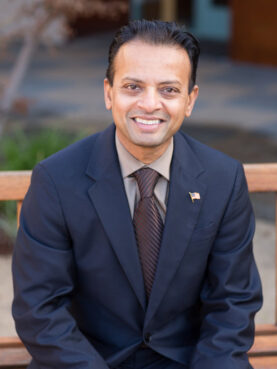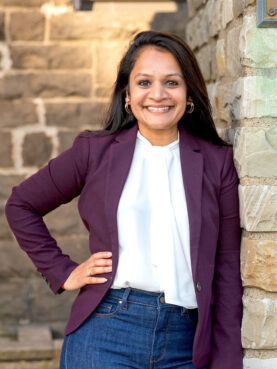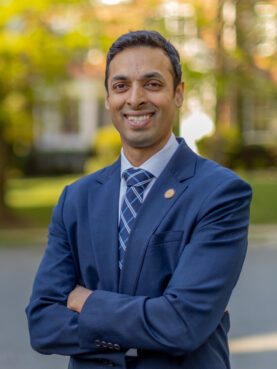
(RNS) — “I’m Hindu, and I’m proud of that,” said Vivek Ramaswamy on the campaign trail in New Hampshire last year. “I stand for that without apology. I think I’m going to be able to be more ardent as a defender of religious liberty.”
Though his presidential campaign fizzled out in Iowa, the tech entrepreneur brought with him an unequivocal lesson: loud-and-proud Hinduism has arrived on the American political scene.
The rising power of Hindu American politics was made obvious in 2019, when some 50,000 people turned out to see then-President Trump and Indian Prime Minister Narendra Modi sharing the stage at Houston’s NRG Stadium at an event called Howdy, Modi!
A fight over a proposed anti-caste discrimination bill in California late last year, however, showed the growing sophistication of Hindus in pursuing political goals. With Hindus from around the country on both sides, opponents and supporters of the bill demonstrated their ability to organize and marshal public and media opinion for their respective causes. (In October, Governor Gavin Newsom vetoed the bill, handing a win to those who said it would harmfully stereotype Hindus.)
Rishi Bhutada, treasurer of the 12-year-old Hindu American PAC, told RNS that Hindus, who have consistently leaned Democrat in elections, are becoming more focused on supporting candidates who grasp their particular needs, from stances on Hinduphobia to resolutions on immigration.
This test is applied to non-Hindu candidates as well as those who share the faith. “Eleven years ago, if someone was a Hindu, I would support them just because I wanted to get a Hindu elected to office,” said Bhutada. “The community is getting way more discerning about candidates now.”
In the past decade, Hindu Americans have had an increasing choice of candidates from their community, from local races to the U.S. Congress. In 2013, former Democrat Tulsi Gabbard, of Hawaii, became the first Hindu congressperson. Democrats Raja Krishnamoorthi from Illinois and Ro Khanna from California were both elected four years later.
“When (Gabbard) won, that opened everyone’s eyes that ‘Hey, a Hindu can get elected to Congress,'” said Bhutada. “Since then, you’ve seen Hindus get elected not only to Congress, but at the state level as well. That’s indicative that Hindus can win in pretty much any part of the country.”
This year three more Hindu Americans, all Democrats, are running for Congress. Here are their backgrounds and what they stand for:
Rishi Kumar

Rishi Kumar. (Courtesy photo)
Emigrating from Mumbai for college, Kumar became a mechanical engineer and tech executive in Silicon Valley, California. He is a “fiscally moderate” Democrat and garnered the most votes in the history of Saratoga’s city council. “It became clear that by integrating our cultural, religious and traditional values with our work ethic and intelligence, we can significantly contribute to strengthening America,” he told RNS, referring to his decision to run for office after a successful tech career.
As a public servant, Kumar says he “strive(s) to be a fearless leader” for his community,” and so far his public career bears him out. The founder of Saratoga Hindu Temple, he opposed the “unfair portrayal” of Hinduism in California textbooks and was honored with the Hindu American Foundation’s Pride of the Community Award in 2019. His private-sector career, meanwhile, has made it possible for him to refuse monetary support from PACs and to propose limits on terms and congressional insider trading.
After opposing the caste bill, Kumar says he is an even stronger advocate against anti-Hindu hatred. “Our Hindu and Indian American community have lately felt very betrayed by our own not stepping up for them,” he said. “There’s an increasing sentiment among Indian Americans across the United States that, despite being seen as a model minority, they are facing unfair targeting and Hinduphobia.
Kumar sees his run as a reflection of the Hindu epic stories he learned while growing up, wherein righteous Hindu gods fought for moral ideals.
“I have been told by some to not take a stance in these matters as it may adversely impact my political profile,” he said. “But my faith has brought me here so far, and there is no reason to ever abandon it for ulterior gains or shortcuts as we have seen some do.”
Bhavini Patel

Bhavini Patel. (Courtesy photo)
Raised by a single mother in the western Pennsylvania district she aims to represent, Patel grew up working on an Indian food truck, a history she said allows her to better connect with other working-class families, telling them the story of promise.
“I am very proud of this idea that a woman from a small village in India, who grew up in poverty and had not seen much of this world, comes to this country, builds a life and then is able to raise a daughter who’s running for Congress,” said Patel, whose mother came to the U.S. from the western Indian state of Gujurat.
Aside from a strong work ethic, Patel credits her mom with teaching her the core values of kindness, truthfulness and authenticity — values she says are inherently tied to Hinduism. “As a young woman raised in a religious home, I’ve seen my mom instill these values in us,” she told RNS. “I’m very proud to represent my faith, and to express it.”
The first member of her family to graduate from college, Patel is on the borough council in her county, where she has focused on education, support for small businesses, equal access to health care and public safety. In 2020, Patel founded the successful startup Beamdata, which helped citizens connect with their elected officials during the pandemic.
“Oftentimes, Hindus and Indian Americans struggle with representation,” said Patel. “But we have a very powerful story to share in this country. People are really excited to see how that’s manifesting on a national stage.”
Suhas Subramanyam

Suhas Subramanyam. (Photo © Gerri Hernandez)
Suhas Subramanyam, currently a delegate serving the Tidewater region in the Virginia Legislature, joined the Obama White House after law school as a technology policy adviser, then made history as the first Hindu and the first Indian American to be elected to office in Virginia. He took his oath of office on the Bhagavad Gita, rather than a Bible.
“When I first ran for office, one of the first things I was told was to change my name,” Subramanyam told RNS. “And to not talk about religion. It was sort of an unknown thing to run openly as an Indian American or Hindu American.” He said he has seen a notable shift in the way Hindus see the value in public service and “how closely it ties with the values of Hinduism.”
Subramanyam’s family attended weekly temple services at the Chinmaya Mission, an organization with chapters around the world that teaches the Vedanta wisdom of Hinduism. He said he took inspiration from the Hindu priests in his mother’s lineage.
“My Hindu faith is where my desire to serve comes from,” he said. “Hinduism is important to me because it has been the catalyst for why it’s important for me to get back into the things I prioritize and value as a public servant.”
In Virginia’s lower house, Subramanyam said, he has seen a lack of action on issues that are important to his community, due in part to the gridlock in Congress: gun violence, clean energy, support for entrepreneurship and, importantly, help with green cards and citizenship for all immigrants.
“I want our community to feel like they have a seat at the table, and I want them to use it,” he said. “It’s more than just having politicians show up at Diwali events. It’s being responsive when there are real issues and concerns in the community.”
